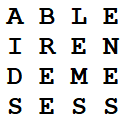
SWEATERDRESSES is typed entirely with the left hand, JOHNNY-JUMP-UP with the right. ANTISKEPTICISM alternates.

SWEATERDRESSES is typed entirely with the left hand, JOHNNY-JUMP-UP with the right. ANTISKEPTICISM alternates.

Bylines appearing in L&N Employees’ Magazine, a house organ of the Louisiana and Nashville Railroad, in the 1940s:
Thinking these fishy, writer Robert Rennick inquired of the railroad’s public relations department and learned that editor Julian James had barred any writer from receiving two bylines in a single issue. So they’d adopted these pseudonyms.
“The assumption was that no reader would ever imagine that these were real names. Yet, W.R. Heffren, writing as C. Ross Tye, once received a letter from a lady genealogist stating that she was researching the Tye family and would he kindly send her his family line to see if it could be related to hers.”
(Robert Rennick, “Fictitious Names,” Word Ways 37:1 [February 2004], 3.)
orbity
n. a bereavement by loss of parents or children
reme
v. to cry out in grief or pain; to lament
philostorgy
n. parental love
asperous
adj. harsh to the feelings; bitter, cruel, severe
Of August Friedrich Schenck’s 1878 painting Anguish, one critic wrote in Figaro, “All the world today regards Schenk as one of our first animal-painters. He is one of those originals, of a species not yet extinct, who prefer dogs to men, and find more sweetness in sheep than in women.”
“It is a little drama, this picture, and as poignant as if it had men for actors and victims.”

A reader once wrote to E.B. White:
Dear Mr. White,
I’m omitting needless words!
Sincerely yours,
[a reader]
He wrote back:
Dear Ms. ——
Thanks. So am I.
Yrs,
E.B. White
(From Mark Garvey, Stylized: A Slightly Obsessive History of Strunk & White’s The Elements of Style, 2009.)

cicurate
v. to tame, to render mild
caniculture
n. the rearing of dogs
naufrageous
adj. in danger of shipwreck
ridibund
adj. inclined to laughter; happy, lively
metagrobolize
v. to mystify
In January 2004 Greg Clark was making a supply run from his home on Kosciusko Island in southeastern Alaska when he radioed that his boat had lost power. With him was his constant companion, Brick, an 8-year-old Labrador retriever. After a three-day search, the Coast Guard found part of the boat’s stern on rocks on the west side of the island, which lies within the 17-million-acre Tongass National Forest.
More than a month afterward, two local fishermen were motoring past Heceta Island, several miles from the accident, when they saw a black animal on the beach. They recognized Brick, who swam to the boat and was hauled aboard. He was underweight, his leg was injured, and his fur was matted with tree sap, but he was “wiggling with joy,” according to CBS News. How the dog had stayed alive for four weeks in the harsh Alaskan winter is unknown.
Discovered by State Farm research agents in 2001:
Antonio Parkway crosses Avenida de las Banderas in Rancho Santa Margarita, California.
Grinn Drive meets Barret Road in West Chester, Ohio.
East Ho Road meets North Hum Road in Carefree, Arizona.
Dock Street connects Hickory Avenue and Dickory Avenue in Harahan, Louisiana.
any-lengthian
adj. unscrupulous
anythingarianism
n. the fact or phenomenon of not holding any fixed or established beliefs

The French phrase Mort ici, j’en ai marre translates as “Dead here, I’m fed up” and sounds like “Morrissey, Johnny Marr.”
(Thanks, Ian.)

REMEDIABLENESSES, written in a spiral, produces a 4 × 4 word square all of whose entries appear in the Oxford English Dictionary.
IREN is a variant of iron, a DEME is an arbiter or ruler, a SESS is an assessment, the BREE is the eyelid, LEMS are lunar excursion modules, and ENES is an archaic form of once.
(Jeff Grant, “Some of My Favorite Squares,” Word Ways 40:2 [May 2007], 96-102.)